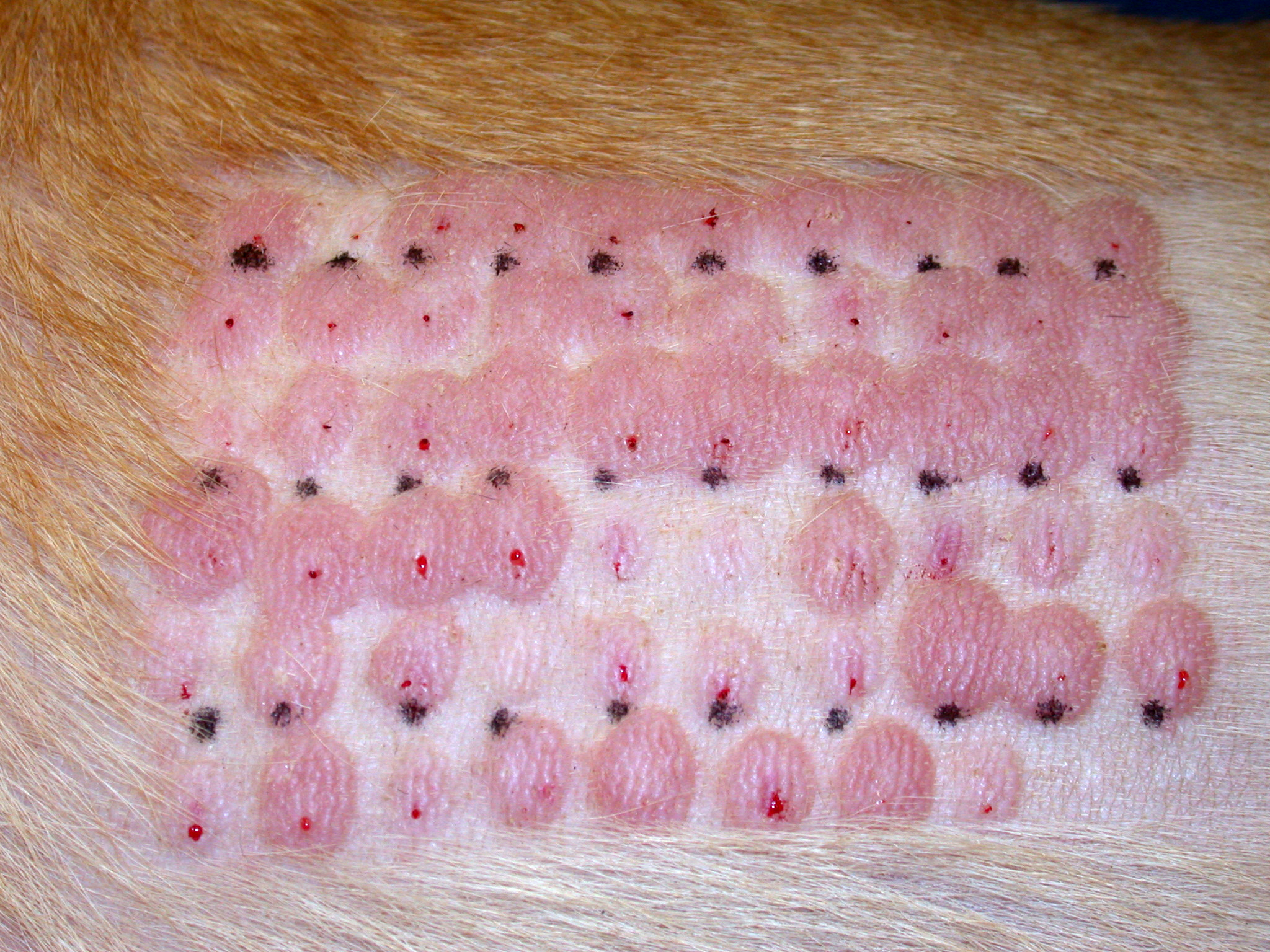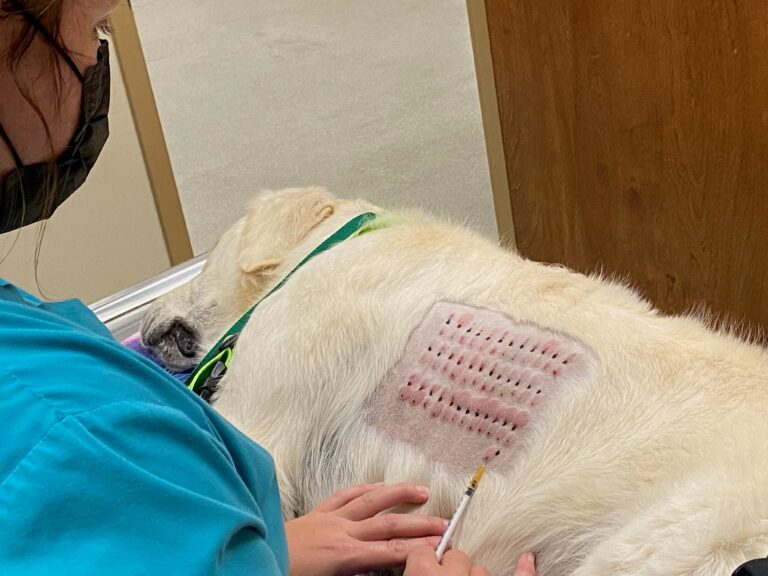The cost of an allergy test for a dog can range from $200 to $300. It depends on the type of test and the clinic.
Finding out the cost of an allergy test for your dog is important for their health and your budget. Allergy tests for dogs are important for identifying and treating allergies that can cause discomfort and health issues. There are different types of allergy tests available, including blood tests and skin tests, which can vary in cost.
To ensure your furry friend’s well-being, it’s essential to understand the various options and their potential costs. By knowing what to expect, you can make informed decisions about your dog’s healthcare. Understanding the costs of allergy testing for dogs will help you provide the best care and good quality of life for your pet.

Credit: www.caninejournal.com
The Importance Of Allergy Testing For Dogs
When it comes to the health and well-being of our furry friends, identifying and understanding their allergies is of utmost importance. Dogs can also suffer from allergies, just like humans do, and it’s crucial for pet owners to be aware of these allergies and their potential impact on their beloved pets. One effective way to determine a dog’s allergies is through allergy testing.
Allergies in dogs can manifest in various ways, from itchy skin and ear infections to gastrointestinal issues and respiratory problems. Identifying the specific allergens that trigger these reactions can help alleviate your dog’s discomfort and improve their quality of life.
Understanding the impact of allergies on dogs is essential in providing them with the necessary care and treatment. Allergies can significantly impact a dog’s overall well-being, leading to persistent discomfort and health issues if left unaddressed. By conducting an allergy test, you can pinpoint the allergens that affect your dog and take the appropriate steps to minimize their exposure.
Allergy testing for dogs involves examining their blood or skin to detect the presence of specific allergens. Veterinarians can perform several types of tests to identify potential allergens, including:
| Test Type | Description |
|---|---|
| Blood Test (Serology) | A blood sample is taken and analyzed to identify antibodies associated with allergies. |
| Skin Prick Test | Small amounts of allergens are applied to the dog’s skin, and any reactions are observed and recorded. |
Allergies can have a significant impact on a dog’s overall health and well-being. Here are some potential consequences of untreated allergies:
- Constant Itching: Dogs with allergies often experience intense itching, leading to skin lesions, hair loss, and discomfort.
- Ear Infections: Allergies can contribute to chronic ear infections in dogs, causing pain and potential hearing loss.
- Gastrointestinal Issues: Some dogs may develop digestive problems, such as vomiting and diarrhea, as a result of allergen exposure.
- Respiratory Problems: Allergies can also affect a dog’s respiratory system, leading to coughing, sneezing, and difficulty breathing.
By understanding the impact of allergies on dogs, you can take proactive measures to manage and treat these allergies effectively. Allergy testing provides valuable insights that enable you to make informed decisions about your dog’s diet, environment, and medication, aiming to improve their overall quality of life and reduce allergic reactions.

Credit: southeastvetderm.vet
Types Of Allergy Tests For Dogs
Allergy tests for dogs are essential in identifying and managing allergic reactions. Several types of allergy tests are available for dogs, including skin prick tests, blood tests, and elimination diets. Each test method helps determine specific allergens that could be causing discomfort to your furry friend.
Skin Prick Test
A skin prick test, also known as intradermal testing, involves injecting small amounts of common allergens into the dog’s skin to observe any allergic reactions. This test can help identify environmental and food allergies, providing valuable insights into the underlying causes of a dog’s discomfort.
Blood Test
Blood tests, such as enzyme-linked immunosorbent assay (ELISA) or radioallergosorbent test (RAST), can identify allergen-specific antibodies present in a dog’s bloodstream. These tests are useful for pinpointing specific allergens that may be triggering allergic reactions, aiding in the development of targeted treatment plans.
Elimination Diet
An elimination diet involves removing potential allergens from the dog’s diet and slowly reintroducing them to pinpoint which items are causing allergic reactions. This method helps identify food sensitivities and intolerances, enabling pet owners to provide suitable dietary adjustments to alleviate allergic symptoms.
Cost Factors To Consider
When considering the cost of an allergy test for your dog, there are several factors to keep in mind to ensure you are prepared for the financial investment. Understanding the different cost factors involved in allergy testing for dogs can help you make informed decisions and budget accordingly. Here are some crucial cost factors to consider when planning for your dog’s allergy test:
Veterinary Clinic Fees
One of the primary cost factors for a dog’s allergy test is the veterinary clinic fees. Veterinary clinics may charge different fees based on their location, reputation, and the level of expertise of the veterinarians. When choosing a clinic for your dog’s allergy test, it’s essential to inquire about the breakdown of the fees and any additional costs that may be involved.
Additional Diagnostic Tests
Depending on your dog’s symptoms and medical history, the veterinarian may recommend additional diagnostic tests to pinpoint the specific allergens affecting your pet. These tests could include blood work, skin scraping, or specialized allergy testing. Each additional test adds to the overall cost of the allergy testing process, so it’s important to be aware of these potential expenses.
Geographical Location
The geographical location of the veterinary clinic can significantly impact the cost of allergy testing for your dog. Urban areas or regions with a higher cost of living may have higher veterinary fees compared to rural areas. Understanding the cost disparity based on location can help you plan for potential variations in allergy testing expenses.
Average Cost Of Allergy Testing For Dogs
Discovering the average cost of allergy testing for dogs can help pet owners determine how much to budget. These tests typically range from $200 to $1,000, depending on the complexity and number of allergens being evaluated.
Overview Of Pricing Range
When your furry friend starts showing signs of allergies, the first step towards finding relief is getting them an allergy test. However, understanding the average cost of allergy testing for dogs can help you plan your budget effectively. The pricing for dog allergy tests can vary depending on several factors. Below, we will explore the pricing range, factors affecting cost, and money-saving tips to ensure your dog gets the care they need without breaking the bank.
Factors Affecting Cost
Several factors can influence the cost of allergy testing for your beloved canine companion. These factors can include:
- The type of allergy test: There are different types of allergy tests available, including blood tests and skin tests. Blood tests may be more expensive than skin tests but can offer a wider range of allergens to be tested.
- The number of allergens tested: The cost can increase if you opt for a comprehensive allergy test that checks for a larger number of allergens.
- Location: The cost of allergy testing can also vary depending on your geographic location and the availability of specialized veterinary clinics.
Tips For Saving Money
Don’t let financial constraints prevent you from providing the necessary care for your furry friend. Here are a few handy tips to help you save money on allergy testing for your dog:
- Shop around: Reach out to multiple veterinary clinics to compare prices before making a decision.
- Consider insurance: If you have pet insurance, check if allergy testing is covered under your policy.
- Ask for payment plans: Some veterinary clinics offer payment plans that allow you to spread out the cost of allergy testing.
- Look for discounts and promotions: Keep an eye out for any discounts or promotions that may be available for allergy testing.
- Consult with your vet: Talk to your veterinarian about affordable alternatives or options that may suit your budget.
Alternative Options For Allergy Testing
Allergy testing is an essential step in identifying and managing allergies in dogs. While traditional veterinary clinics offer allergy testing, there are also alternative options available that provide convenience and cost-effectiveness. By exploring these alternative options, dog owners can make informed decisions about their pets’ health. In this blog post, we will discuss two alternative options for allergy testing: Home Testing Kits and Telemedicine Services.
Home Testing Kits
Home testing kits for allergy testing in dogs have gained popularity in recent years. These kits provide a simple and convenient way to test for a variety of common allergens that may be affecting your furry friend. With a home testing kit, you can collect a small blood sample from your dog’s vein or paw pad following the provided instructions. The kit will then be sent to a laboratory where experts will analyze the sample.
Using a home testing kit has several benefits. Firstly, it eliminates the need for a veterinary visit, saving you time and reducing stress for your dog. Additionally, home testing kits offer a wider range of allergens compared to standard veterinary clinics, allowing you to identify specific triggers that may be causing your dog’s allergies. Moreover, home testing kits are often more affordable, making allergy testing more accessible to a larger number of dog owners.
Telemedicine Services
Telemedicine services have revolutionized the field of veterinary care, allowing pet owners to seek expert advice from the comfort of their own homes. Allergy testing is no exception, as telemedicine services now offer convenient options for testing and diagnosis. By connecting with a licensed veterinarian through a video call or online chat, dog owners can discuss their pet’s symptoms and receive guidance regarding allergy testing.
Telemedicine services typically involve guidance on how to perform a skin prick test at home. This test involves exposing your dog’s skin to a small amount of potential allergens and observing any reactions. By following the veterinarian’s instructions, you can conduct the test and share the results for analysis. Based on these results, the veterinarian can provide you with customized advice and treatment options.
Telemedicine services are beneficial for several reasons. They eliminate the need for physical visits to a veterinarian, saving you both time and transportation costs. These services also provide access to professional guidance and expertise, ensuring accurate allergy testing and proper management. With the convenience of telemedicine, dog owners can take proactive measures to address their pets’ allergies and improve their overall quality of life.

Credit: www.animaldermatologyspecialists.com
Frequently Asked Questions For How Much Is An Allergy Test For A Dog
How Much Does An Allergy Test For A Dog Cost?
An allergy test for a dog can cost anywhere between $200 and $600, depending on the type of test and the clinic you choose. It’s important to consult with your veterinarian to determine the best option for your dog’s specific needs and budget.
What Is Involved In An Allergy Test For A Dog?
An allergy test for a dog typically involves taking a blood sample or conducting a skin prick test to identify potential allergens. The sample is then sent to a lab for analysis, and the results can help your veterinarian develop a tailored treatment plan for your dog’s allergies.
How Long Does An Allergy Test For A Dog Take?
The duration of an allergy test for a dog can vary, but in general, it may take a few weeks to receive the results. This timeline includes the time required for the sample to be analyzed in a lab. Your veterinarian will provide you with more specific information based on the type of test being conducted.
Conclusion
Understanding the cost of an allergy test for your dog can help you make informed decisions about their health. By consulting with a veterinarian, you can explore different testing options and their associated prices. Remember, the investment in an allergy test is worth it to provide your furry friend with the necessary care and attention they deserve.
Prioritize your dog’s well-being by ensuring their allergies are diagnosed and managed effectively.



